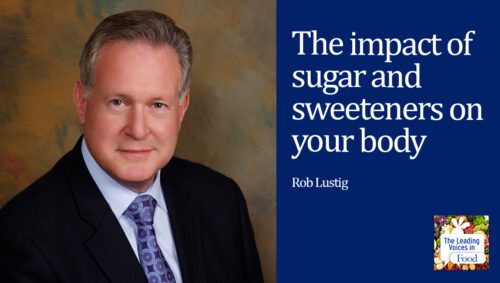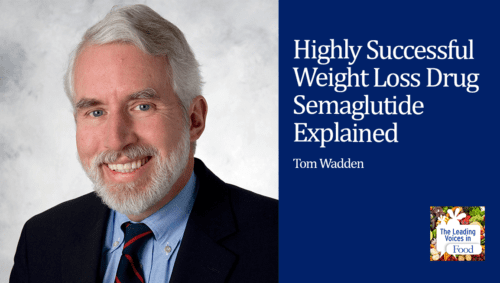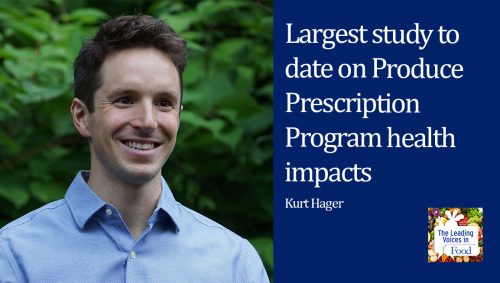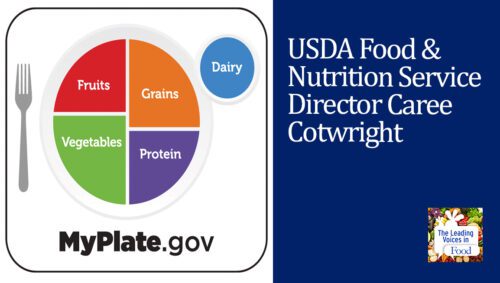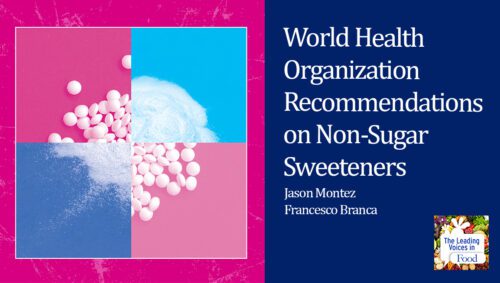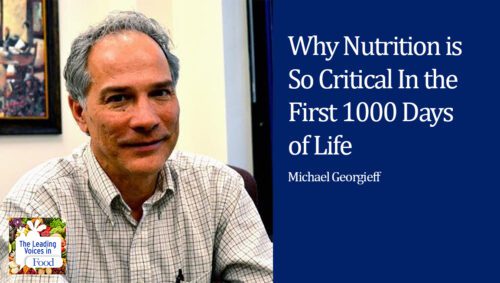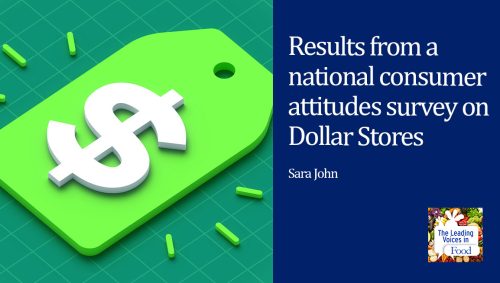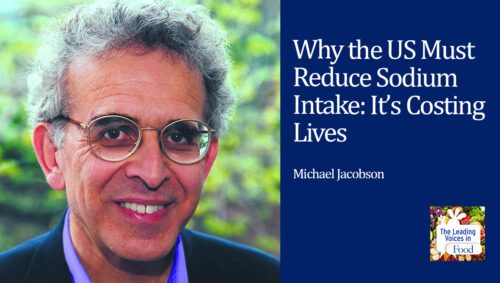The Leading Voices in Food
E87: The Hidden Dangers of Sugar for your Kids
This is the first of two podcasts with the authors of a new book entitled, Sugarproof: The Hidden Dangers of Sugar that are Putting Your Child’s Health at Risk and What You Can Do. This podcast will cover the wide-ranging effects of sugar on children, and the second podcast will address what can be done in the home and with policy. University of Southern California, Michael Goran, leads the program in diabetes and obesity at Children’s Hospital in Los Angeles. His co-author, Dr. Emily Ventura, is a nutrition educator, public health advocate, writer and cook.

Dr. Michael Goran is one of the world’s most widely recognized experts in childhood nutrition and obesity research, with more than 30 years of experience as a researcher, mentor, and educator. He is a Professor of Pediatrics at the University of Southern California, Keck School of Medicine, Co-Director of the USC Diabetes and Obesity Research Institute and leads the Program in Diabetes and Obesity at the Children’s Hospital of Los Angeles. He holds the Dr. Robert C and Veronica Atkins Endowed Chair in Childhood Obesity and Diabetes. Michael is a native of Glasgow, Scotland, and received his Ph.D. from the University of Manchester, UK.
Dr. Emily Ventura is an experienced nutrition educator, public health advocate, writer, and cook. After working in writing and public relations in the arenas of environmental protection and food, she completed her Master’s in Public Health and Doctorate of Philosophy in Health Behavior Research at the University of Southern California. She was selected as a Fulbright Scholar to teach Public Health Nutrition in Italy and now lives in California and works as a writer, recipe developer, and mother to two young boys.
Interview Summary
So let me ask both of you this question, what was your main motivation for writing this book Sugarproof? Michael, let’s begin with you.
Sure. Children in the US are surrounded by sugar everywhere they turn in today’s food environment. Really what I wanted to do was get this message out to a broader audience of people so that the public could better understand the sources of sugar and added sugars and all its different disguises. And, more than that, we wanted to create a guide that families could use, practical solutions that could be broadly applicable to help them protect their kids and their families from the effects of excess sugars.
Thanks Michael and Emily how about your motivation for this, writing this book.
Well just like Michael said, it feels so good to have everything in one place, and to compile all this research and the practical solutions. These themes that we talk about in Sugarproof are all ones that I’ve been working with families for 20 years I’d say. Just keep coming up against the same topics and the same challenges. And then after I had kids, I have two young boys who are four and seven, I realized even more so, just how tricky this is to navigate.
Thank you, so the book sounds like a very nice blend of the most recent science on the topic with some very practical, helpful solutions for people. Michael, what are some of those surprising ways that sugar affects the health of children?
So it’s clear that sugar has profound effects on the body, and this process begins before birth. Sugar literally affects children’s bodies head to toe. So this could be effects on brain development, cognitive outcomes, or learning ability. And as you work your way through the body effects on the GI system, gut microbiome development, digestive problems, and then longer term risk for things like diabetes and fatty liver disease, which often will be asymptomatic and progress silently. But these effects are seated in childhood with early risk factors. And then there’s acne and skin health and other inflammatory conditions as well which are all related to increased sugar consumption.
Well that’s a pretty wide ranging set of impacts. And let’s talk a little bit more about how sugar can impact mood and focus and concentration. Can you tell us more about this and how these things might turn affect academic performance?
There’s no a ton of research on this but a large study out of Australia, 4,000- 5000 children showed that children who had higher consumption of sugary beverages which includes sodas and juices, et cetera, perform more poorly in academic tests of math and verbal reasoning and reading and so on. Also, in addition to that, the whole question of whether sugar affects mood and behavior, studies do show that sugar consumption in the short term can affect mood and concentration, disrupts energy levels. For example, we talk in the book about whether or not increased sugar consumption spikes energy levels. The research on this is pretty mixed but overall, what we see is that there is an acute relationship between sugar consumption and energy levels to do with blood sugar concentration. So, we’ll see a spike in energy levels and then sudden crashes as blood sugar falls rapidly affecting mood and focus and concentration throughout the day.
Emily, let me ask you this, my guess is that these effects aren’t very widely known, especially among the public, but even among scientific professionals, is that true?
One thing that we talk a lot about in the book is about breakfast—and how your choice of breakfast really does shape your concentration and your mood throughout the morning. It’s interesting that you ask if parents realize that. I think a lot of us parents don’t see some of those effects because we feed our kids breakfast and then we send them off to school. But now that a lot of kids will be home—more often homeschooling, especially now with the COVID-19 situation—it’s going to become even more apparent. and we talk a lot about how you can change what you give your kids for breakfast and reduce the sugar and increase fiber and protein and healthy fat, and how that’ll give your kids more steady energy and a better focus and concentration throughout the morning.
So, why is sugar so problematic for children relative to adults?
I think there’s a couple of issues here at play. Babies are born with an innate preference for sweetness. A child has a much higher liking or preference for sweet foods. So, given the opportunity, children are going to consume more of those sweeter foods than adults. This is the first stage of the perfect storm. They’re primed to consume more sweet food and 70% of processed foods and 80% of snack foods have added sugars, and so they’re going to want to consume more of those. But it’s more than that. What we’re seeing now is that during the developmental process, the body is more vulnerable, susceptible to the effect of those sugars. I’ll give you a couple of examples. One is a very tangible example and that is tooth decay. We know that sugar causes tooth decay. Why is that? Because sugar feeds bacteria in the mouth and those bacteria produce acid and that acid breaks down teeth and ruins them. Why are children more vulnerable to that? That’s because teeth are still developing and during that stage of tooth development, they don’t have the enamel to protect the teeth from the acid produced by the bacteria that are eating off of sugar. Also, infants and children tend to consume food more frequently throughout the day compared to adults, so there’s more exposure.
So it’s a very tangible example of how tooth development makes kids more vulnerable to the effects of sugar but there’s other more subtle examples as well. Because organs are being built. Brains are being built. The pancreas is being built. The liver is being built. And during this process of building, excess sugars can basically disrupt that process of development. And another example, not really been proven yet in adult models, but in animal models, in terms of brain development, if you expose rats to high sugar during the adolescent period of brain development, it can basically hardwire their brain to disrupt memory function long term. And studies have shown that it’s only during the period of adolescence, when that damaging effect of sugar has its long term hardwiring effects on the brain. If you give a rat sugar during adolescence, and then take it away and study it six months later when it’s an adult, the effects of that sugar are hardwired. And that’s because sugar in some way is disrupting the building blocks of the different organs during growth.
So, Michael, what’s the difference between sucrose and fructose and how is it important in this context?
So sucrose is ordinary table sugar that you buy at the grocery store. It’s two sugars connected to each other and those two sugars are glucose and fructose. Glucose and fructose are very similar but have different properties in the body. So, glucose is what every cell of your body uses for energy to support its function, whether that’s brain function or the energy in your muscles to move around or your heart beating, that energy comes from glucose. Fructose, on the other hand, which is twice as sweet as glucose by the way when it’s consumed by itself, is taken up by the liver and converted to fat. And that fat can cause fatty liver disease, which is now increasing in prevalence nationally, including in children or the fructose can be converted into fat and released into their circulation. And that’s where we get the connection between sugar, mostly fructose, and cardiovascular risk, and that’s to do with the conversion of that fructose into fats that then circulate in the bloodstream.
So is fruit juice a problem?
Yes . Fruit juice is, in our view, a problem because it is concentrated sugars. Eating fruit is not a problem because there’s much less sugar. So for example, if you took a glass of apple juice, you would be consuming the sugars in concentrated form from about three apples. So it’s fine to eat an apple, nobody’s going to eat three apples in one go. But drinking a glass of fruit juice will give you the sugars all at once. And that’s important because not only do you have more sugar, but, it’s very rapidly consumed. And it’s that rapid consumption and rapid uptake into the liver that starts this whole cascade of problems. So yes, drinking fruit juice is a problem because it has just as much sugar as soda, sometimes more.

